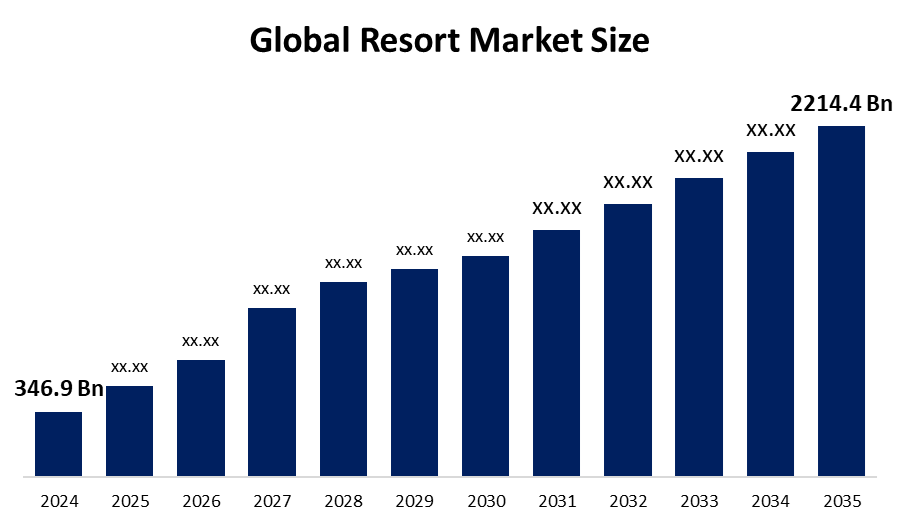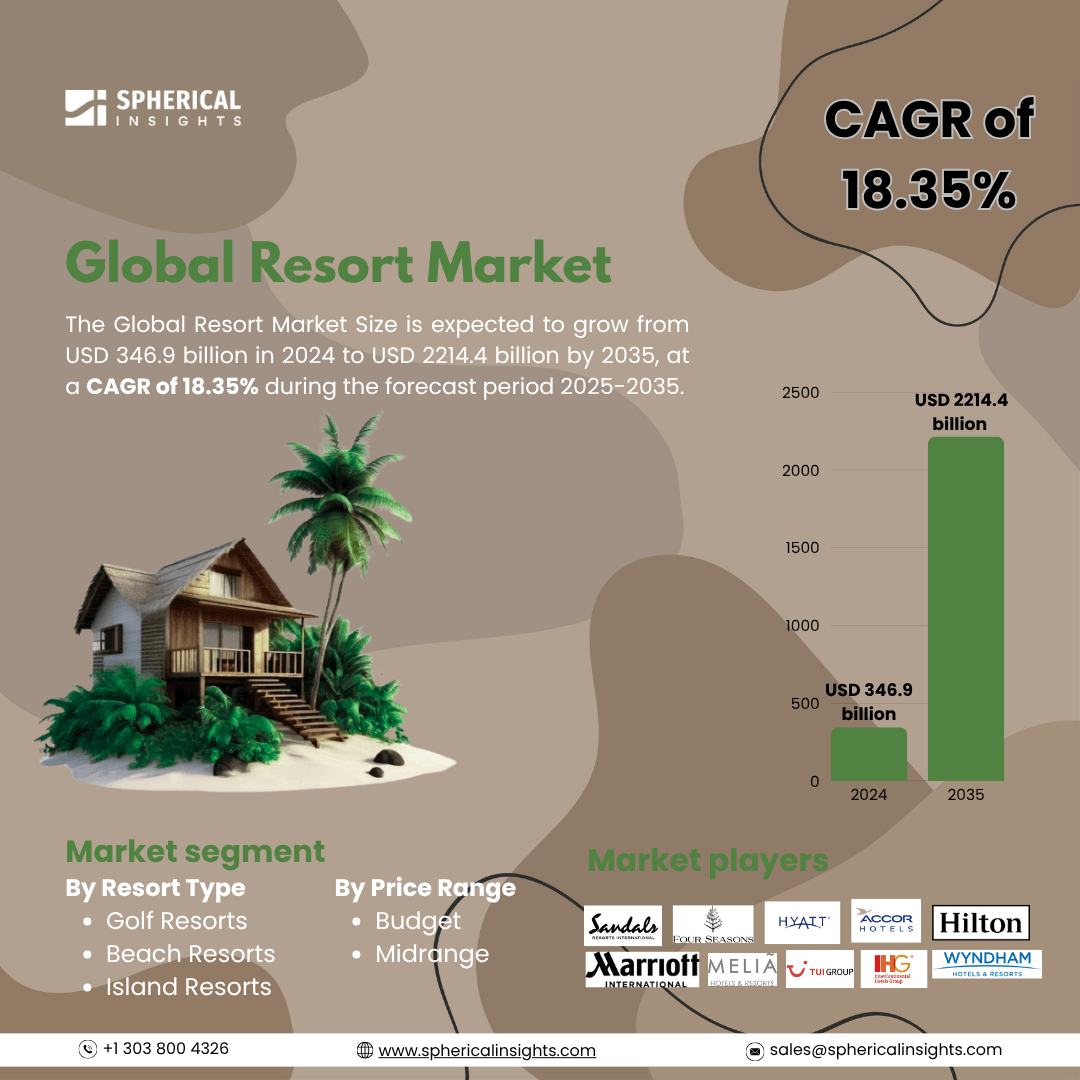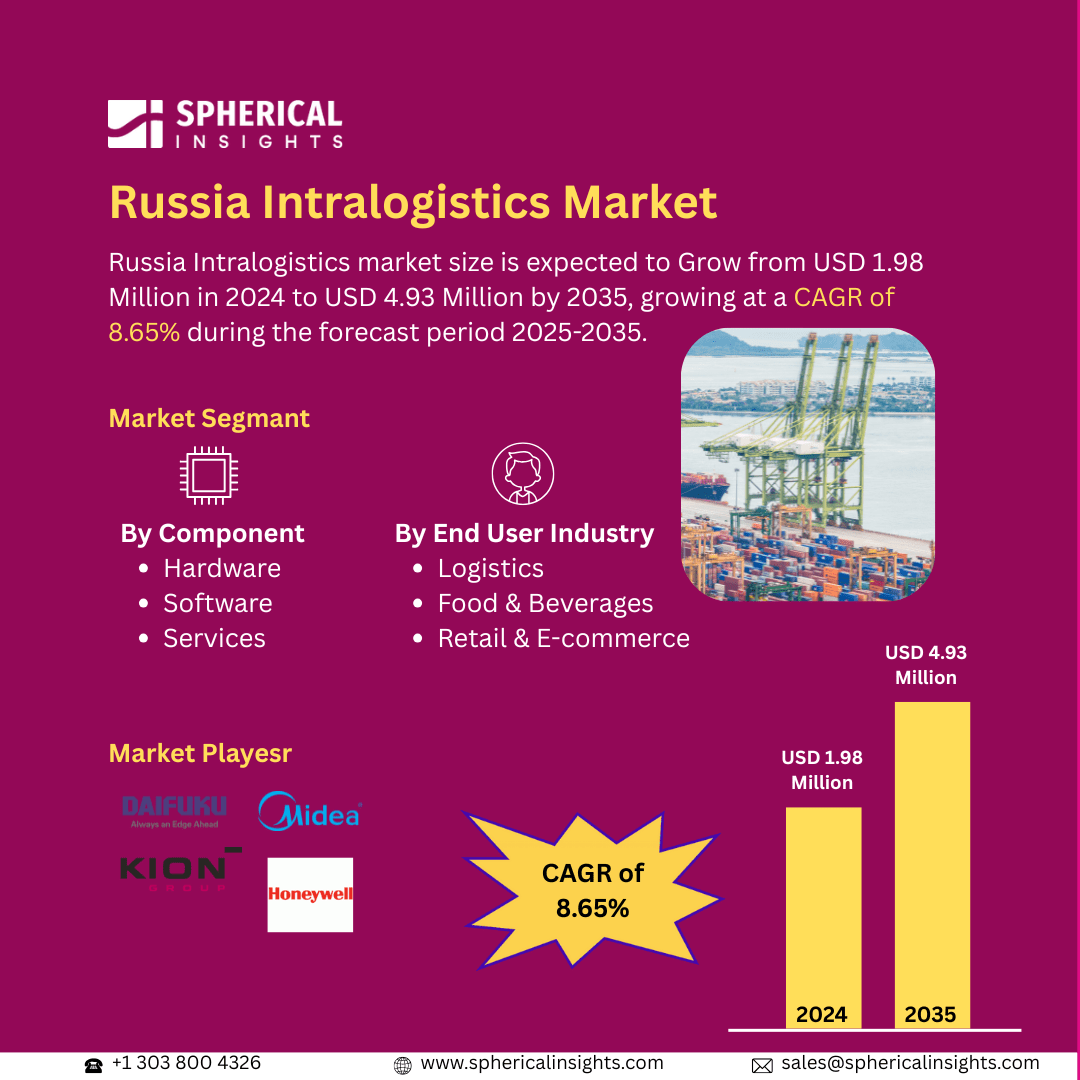Global Resort Market Insights Forecasts to 2035
- The Global Resort Market Size Was Estimated at USD 346.9 Billion in 2024
- The Market Size is Expected To Grow at a CAGR of around 18.35% from 2025 to 2035
- The Worldwide Resort Market Size is Expected to Reach USD 2214.4 Billion by 2035
- Europe is Expected to Grow the fastest during the forecast period.

Resort Market
The global resort market encompasses a wide range of leisure-focused establishments offering accommodations, entertainment, dining, and various recreational activities. Resorts are designed to provide immersive, relaxing experiences for travelers, with offerings ranging from luxury and all-inclusive resorts to eco-friendly and wellness-focused retreats. These establishments are typically located in prime tourist destinations, including tropical islands, coastal areas, and popular mountain regions. Resorts cater to diverse customer preferences, with options for family vacations, romantic getaways, and adventure tourism. The market is highly competitive, with both large international hotel chains and independent boutique resorts vying for market share. Additionally, there has been a noticeable trend toward experiential tourism, where guests seek unique and personalized vacation experiences. The market continues to evolve with a growing emphasis on sustainability, wellness, and the integration of technology to enhance guest services, such as digital check-ins and virtual concierge services.
Attractive Opportunities in the Resort Market
- Resorts that adopt green practices like renewable energy, organic food sourcing, and waste reduction can attract eco-conscious travelers, aligning with the rising global trend toward sustainable tourism.
- With increasing demand for wellness experiences, resorts can cater to travelers seeking holistic services like spa treatments, yoga retreats, and detox programs, capitalizing on the growing health-conscious trend.
- The rise of experiential tourism offers resorts an opportunity to provide personalized, immersive experiences, including adventure sports, cultural excursions, and culinary tours, enhancing customer engagement and satisfaction.
- The adoption of AI-driven services, smart rooms, and digital concierge can elevate the guest experience, offering greater convenience and personalization, which appeals to tech-savvy travelers.
Global Resort Market Dynamics
DRIVER: Consumer preferences and emerging travel trends is propelling the growth
A blend of evolving consumer preferences and emerging travel trends is propelling the growth of the global resort market. As travelers increasingly prioritize experiences over material goods, the demand for resorts that offer more than just a place to stay is on the rise. Resorts are now expected to provide immersive, unforgettable vacations, offering everything from adventure sports and cultural exploration to wellness and relaxation. The rise of affluent travelers with higher disposable incomes has also expanded the market for luxury resorts, especially those that cater to niche interests such as eco-tourism and holistic health. In addition, digital advancements in booking platforms and in-room technology are making resort experiences more convenient and streamlined. The resurgence of international travel, along with a growing desire for sustainable tourism options, has spurred demand for resorts that align with both environmental and personal wellness goals. This combination of factors is driving the continued evolution of the resort industry.
RESTRAINT: Environmental issues pose a threat, especially to resorts in coastal or tropical areas
Economic downturns, inflation, and political instability in key travel destinations can reduce consumer spending on vacations, making resorts more vulnerable to market fluctuations. Environmental issues like climate change, natural disasters, and extreme weather also pose a threat, especially to resorts in coastal or tropical areas. Regulatory constraints, such as limits on development and tourist numbers in certain locations, can hinder the expansion of new resorts. Additionally, rising operational costs, including labor, energy, and the investment needed for sustainability, put financial pressure on resort businesses. The growing popularity of vacation rentals further intensifies competition, as many travelers seek more affordable or personalized lodging options, challenging traditional resorts to innovate and adapt.
OPPORTUNITY: Rise of experiential travel creates a chance for resorts
The global resort market is brimming with exciting opportunities for growth and differentiation. As eco-conscious travel becomes increasingly popular, resorts that embrace sustainability can stand out by incorporating green practices such as renewable energy, organic food sourcing, and waste reduction. This not only appeals to environmentally aware tourists but also helps future-proof the business. The growing trend of wellness tourism presents another opportunity, as resorts can capitalize on the demand for holistic experiences, offering everything from detox programs to mindfulness retreats. Additionally, the rise of experiential travel creates a chance for resorts to offer tailored, one-of-a-kind experiences like adventure sports, cultural excursions, or culinary tours, enhancing guest engagement. Technological advancements also provide a competitive edge, with smart rooms, AI-driven customer service, and personalized digital experiences enhancing the overall guest experience. Furthermore, tapping into new and emerging markets, particularly in Africa and Asia, where rising middle-class populations are fueling travel demand, can unlock significant growth potential.
CHALLENGES: Seasonal fluctuations in tourist demand can lead to revenue inconsistencies
Rising operational costs, including labor and energy expenses, strain profit margins, while the need for sustainable practices demands significant upfront investments. Seasonal fluctuations in tourist demand can lead to revenue inconsistencies, particularly for resorts in destination-specific regions. Geopolitical instability and unforeseen events, like pandemics or natural disasters, can disrupt bookings and operations. The growing popularity of short-term vacation rentals intensifies competition, forcing resorts to continuously adapt. Additionally, navigating complex regulatory frameworks around zoning, environmental protections, and development restrictions can slow down expansion and innovation efforts.
Global Resort Market Ecosystem Analysis
The global resort market ecosystem involves a range of interconnected players. Resort owners and operators form the foundation, managing accommodations, dining, and experiences. Suppliers provide essential services, from food and tech to sustainability solutions. Travel agents and tour operators bridge the gap between resorts and consumers, facilitating bookings. Consumers drive demand, with growing interest in wellness, luxury, and eco-tourism. Regulatory bodies enforce environmental and safety standards, while sustainability organizations advocate for greener practices. Technology providers are increasingly influential, offering innovations like digital booking systems and smart amenities to enhance both guest experience and operational efficiency.
Based on the resort type, the beach resorts segment held the largest revenue share and is expected to grow at a substantial CAGR during the forecast period

The beach resorts segment growth can be attributed to the enduring popularity of coastal destinations, which offer a combination of relaxation, scenic beauty, and water-based activities. Beach resorts appeal to a wide range of travelers, from families and honeymooners to adventure seekers, all seeking the idyllic beach vacation experience. Additionally, the increasing trend of wellness tourism, where travelers seek rejuvenation by the sea, and the rising demand for luxury experiences are further propelling the growth of this segment. With advancements in resort offerings, such as eco-friendly developments and all-inclusive packages, beach resorts are expected to continue attracting a global customer base, ensuring their dominance in the market.
Based on the price range, the midrange segment accounted for the highest revenue share and is expected to grow at a substantial CAGR during the forecast period

The segment’s popularity can be attributed to its broad appeal, offering a balance between affordability and quality. As travelers increasingly seek vacation options that provide a high level of comfort and amenities without the premium price tag of luxury resorts, the midrange segment is well-positioned to attract a diverse range of customers. The growth in this segment is further driven by improved offerings and enhanced services, which make these resorts more competitive. As economic conditions evolve and travel preferences shift, midrange resorts are likely to continue to thrive, catering to a growing demand for value-oriented yet enjoyable vacation experiences.
Based on the booking mode, the travel agents & online travel agencies (OTAs) segment accounted for the highest revenue share and is expected to grow at a remarkable CAGR during the forecast period

The travel agents & online travel agencies (OTAs) segment's dominance can be attributed to the increasing reliance of consumers on online platforms to plan and book their vacations. OTAs offer a convenient and seamless booking experience, providing access to a wide variety of resort options, often with competitive pricing and exclusive deals. Additionally, the ease of comparing different resorts and reading customer reviews has made OTAs a preferred choice for many travelers. As digital transformation continues to reshape the travel industry, this segment is expected to grow significantly, driven by factors like increased smartphone usage, the rising popularity of online booking platforms, and the growing trend of consumers seeking personalized travel experiences through digital channels.
Asia Pacific is anticipated to hold the largest share of the resort market during the forecast period
The region's dominance can be attributed to several key factors, including its booming tourism industry, the increasing number of international and domestic travelers, and the growing demand for diverse resort experiences. Asia Pacific offers a wide range of resort destinations, from tropical beach resorts in Southeast Asia to high-altitude mountain resorts in countries like China and Japan. Additionally, the rising middle class, particularly in countries like China and India, is driving more people to seek leisure travel and resort experiences, further boosting the region’s market share. Furthermore, Asia Pacific is becoming a hub for both luxury and midrange resorts, catering to varying customer preferences and budgets. With increasing disposable income, improved infrastructure, and favorable government policies supporting tourism, Asia Pacific is well-positioned to maintain its leading share in the global resort market.
Europe is expected to grow at the fastest CAGR in the resort market during the forecast period
Europe is poised for fastest growth in the resort market during the forecast period, driven by its diverse tourism offerings, from beach and ski resorts to wellness retreats. Popular destinations like Spain, Italy, and Switzerland continue to attract both regional and international visitors. The growing demand for unique, immersive experiences and sustainable travel options is boosting the market. Additionally, the region’s expanding digital infrastructure, ease of access, and rise in both luxury and midrange resorts are making European destinations more appealing. With a recovery in post-pandemic travel, Europe’s resort market is set to experience substantial growth in the coming years.
Recent Developments of the Resort Market
- In April 2024, Wyndham Alltra has just unveiled its latest resort on the coast of the Samaná Peninsula in the Dominican Republic. Situated in Las Galeras, the Wyndham Alltra Samaná offers a family-friendly, all-inclusive experience with breathtaking ocean views, pristine white beaches, and a variety of entertainment options for guests. This resort, managed by Playa Hotels & Resorts—one of the top global operators of all-inclusive properties—marks Wyndham Alltra’s debut in the Dominican Republic. Later this year, Wyndham will also launch Wyndham Alltra Punta Cana, also managed by Playa. These new additions contribute to Wyndham’s rapidly expanding all-inclusive portfolio, which now includes nearly 40 resorts worldwide.
Key Market Players
KEY PLAYERS IN THE RESORT MARKET INCLUDE
- Marriott International
- Hilton Worldwide
- Accor Hotels
- Four Seasons Hotels and Resorts
- Wyndham Hotels & Resorts
- Sandals Resorts
- TUI Group
- Hyatt Hotels Corporation
- InterContinental Hotels Group (IHG)
- Melia Hotels International
- Others
Market Segment
This study forecasts revenue at global, regional, and country levels from 2020 to 2035. Spherical Insights has segmented the resort market based on the below-mentioned segments:
Global Resort Market, By Resort Type
- Golf Resorts
- Beach Resorts
- Island Resorts
Global Resort Market, By Price Range
Global Resort Market, By Booking Mode
- Direct Booking
- Travel Agents & Online Travel Agencies (OTAs)
- Marketplace Booking
Global Resort Market, By Regional Analysis
- North America
- Europe
- Germany
- UK
- France
- Italy
- Spain
- Russia
- Rest of Europe
- Asia Pacific
- China
- Japan
- India
- South Korea
- Australia
- Rest of Asia Pacific
- South America
- Brazil
- Argentina
- Rest of South America
- Middle East & Africa
- UAE
- Saudi Arabia
- Qatar
- South Africa
- Rest of the Middle East & Africa







